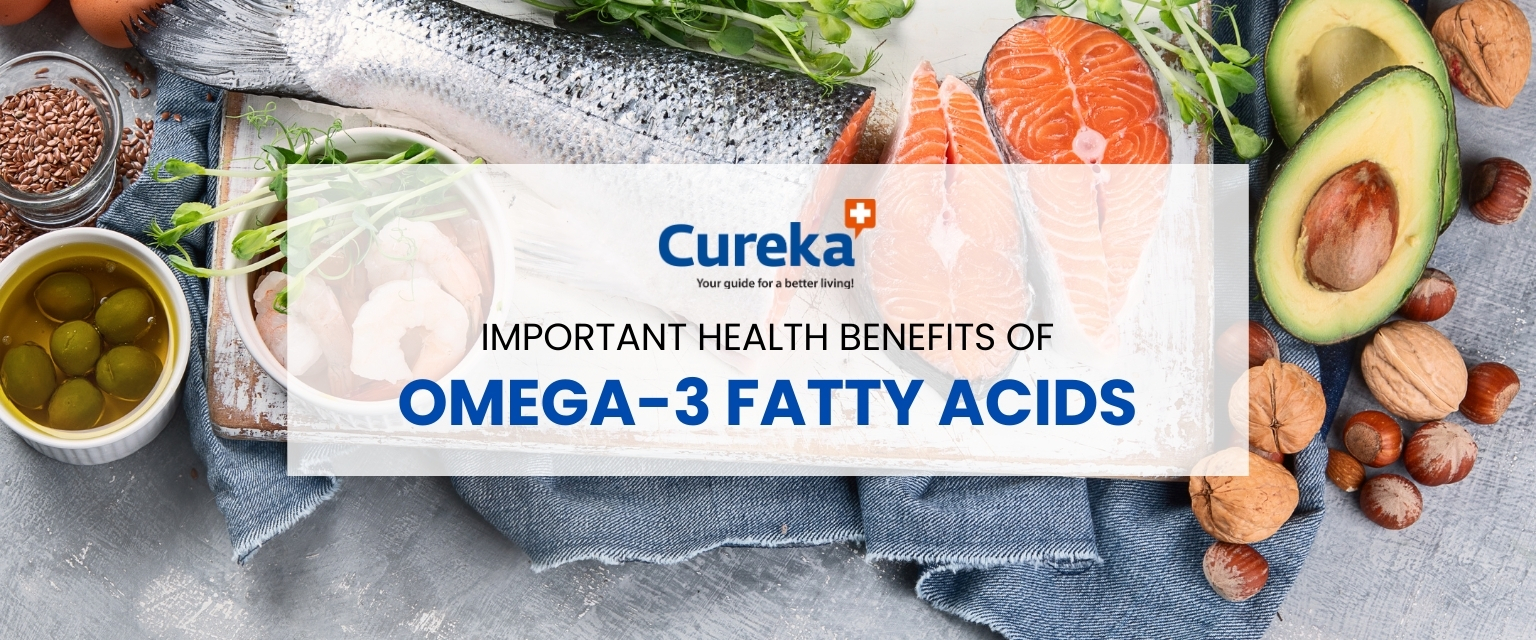Important Health Benefits of Omega-3 Fatty Acids
Important Health Benefits of Omega-3 Fatty Acids
When we hear the word fat, we always associate it with negative aspects like fats can contribute to increased cholesterol and increased risk of cardiovascular disease. These saturated fats and trans fats are called bad fats that are known for their negative impact on health. But there are good fats, such as monounsaturated fats and polyunsaturated fats, that have positive effects on heart health, brain function, and overall well-being.
Did you know that? Omega-3 fatty acids are like VIP’s of our brain. They are one of the polyunsaturated fatty acids that are essential for good health. These fats are important for various physiological functions in the body. Omega-3 fatty acids cannot be produced by the body, so they must be obtained from food. Research suggests that optimum intakes may improve cognitive function and lower the risk of age-related mental decline. Here let’s have an overview on its type, enriched foods and its benefits.
Three types of omega-3 fatty acids:
- Alpha-linolenic acid (ALA): This is a plant form of omega-3 fatty acid found in certain vegetable oils, flaxseed, chia seeds, and walnuts.
- Eicosapentaenoic acid (EPA): EPA is primarily found in fatty fish such as salmon, mackerel, and sardines and is known for its anti-inflammatory properties. It plays an important role in cardiovascular health and is associated with a variety of health benefits.
- Docosahexaenoic acid (DHA): Similar to EPA, DHA is primarily found in fatty fish. It is essential for brain health and cognitive function because it is a key structural component of the brain, retina, and nervous system. DHA is especially important for fetal brain development during pregnancy.
Omega-3 fatty acid enriched foods:
- Fish and other sea foods – salmon, mackerel, tuna, sardines, herring, etc.
- Nuts and seeds: Chia seed, flax seed, walnut, etc.
- Plant oil: Soybean Oil, Canola Oil, Flaxseed oil, etc.
Daily Requirement:
The National Institutes of Health recommends consuming 1.1to1.6 grams of omega-3 fatty acids per day as a part of a heart-healthy diet. It takes about 4to5 ounces of Atlantic salmon to get 3 grams of omega-3 fatty acids. Two servings of fatty fish per week can justify the required amount of an individual.
Health benefits:
- Heart health:
-
- Omega-3 fatty acids are cardiovascular superheroes. They actively lower triglyceride levels, lower blood pressure, and play an important role in preventing heart related diseases.
- Anti-inflammatory effects in Omega-3 fatty acids help reduce inflammation in the body, which is an important factor in cardiovascular disease.
- Brain health:
-
- One of the types of omega-3 is DHA, which is a major component of the brain. Scientific studies have linked omega-3 intake for improved cognitive function, reduced risk of age-related cognitive decline.
- Omega-3 fatty acids may have a positive effect on mood and can help treat conditions such as depression and anxiety.
- Eye health:
-
- DHA, a component of omega-3 fatty acids, plays an important role in eye health. They help protect against age-related macular degeneration (AMD), by maintaining clear vision as we age.
- Joint health:
-
- For those suffering from joint problems, omega-3 fatty acids can provide relief for their concern. Their anti-inflammatory properties make them effective in treating conditions such as arthritis, reducing discomfort, and promoting joint health.
- Fetal development:
-
- Omega-3 fatty acids are the essential factors of fetal brain and eye development. Pregnant women are often advised to consume sufficient amounts of omega-3 fatty acids for the healthy development of their baby.
- Supplementing with omega-3 during pregnancy reduces the risk of premature birth.
- Anti-inflammation:
-
- Omega-3 fatty acids act as natural anti-inflammatory agents, making them valuable to people suffering from autoimmune diseases such as rheumatoid arthritis and inflammatory bowel disease. It provides relief and support by regulating the body’s inflammatory response.
- Skin health:
-
- Having glowing skin is everyone’s dream. Omega-3 fatty acids can help treat a variety of skin conditions. Its anti-inflammatory properties relieve skin conditions such as eczema and psoriasis, promoting overall skin health.
- Possible protective effects on cancer:
-
- Some studies suggest that omega-3 fatty acids may have protective effects against certain types of cancer, but further research is needed to confirm these results.
Incorporating omega-3-rich foods such as fatty fish, flaxseeds, chia seeds, and walnuts into your diet is a delicious and a healthy option. For those who need additional support, nutritional supplements sources are available to ensure the required amount.
It’s important to note that omega-3 fatty acids offer many health benefits, but it is also important to have a balanced and varied diet. We recommend that you consult your doctor before making any major changes to your diet or taking any nutritional supplements, especially if you have any previous medical condition or are taking any medications. Finally, harness the power of omega-3 fatty acids, a natural source of vitality and health. By incorporating them into our lives, we can take positive steps toward a healthier heart, sharper mind, and overall improved quality of life.
You can explore a range of nutritional supplements at cureka.com














